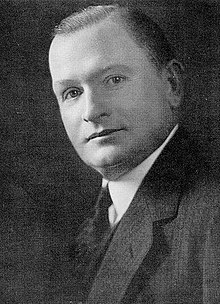Francis P. Murphy
| Francis Parnell Murphy | |
|---|---|
 |
|
| 64th Governor of New Hampshire | |
|
In office January 7, 1937 – January 2, 1941 |
|
| Preceded by | Styles Bridges |
| Succeeded by | Robert O. Blood |
| Member of the New Hampshire House of Representatives | |
| Personal details | |
| Born |
August 16, 1877 Winchester, NH |
| Died | December 19, 1958 (aged 81) Nashua, NH |
| Political party |
Republican (1931-1941) Democratic (1942-1958) |
| Religion | Catholic |
Francis Parnell Murphy (August 16, 1877 – December 19, 1958) was a manufacturer and politician from Nashua, New Hampshire. He served in the New Hampshire House of Representatives and on the Governor's Council before being twice elected as a Republican Governor.
Murphy supported Roosevelt's New Deal policies and switched to the Democratic Party in an attempt to unseat U.S. Senator Styles Bridges in the 1942. He retired from politics to enter the radio broadcasting business and later started the WMUR radio and television stations in Manchester.
A large flood control project in northern New Hampshire at the headwaters of the Connecticut River is named for him, with Murphy Dam impounding Lake Francis. He was also responsible for one of the first ski area aerial tramways in the United States when the Cannon Mountain tramway was built in Franconia Notch, New Hampshire.
Murphy was the fourth of eight children born to Irish immigrant Roman Catholic parents. His father was a tannery worker and a Civil War veteran.
Murphy graduated from high school in the factory town of Hudson, Massachusetts and secured an entry-level job nailing packing cases for shoes together at a local shoe factory. Murphy worked his way up from this entry position, holding successively more responsible jobs at factories in Newport, Manchester, and Nashua.
During World War I Murphy was chairman of New Hampshire's Committee on Electric Power Supply, and he was a longtime member of the New Hampshire National Guard. In 1922 Murphy and two partners organized the J.F. McElwain Company, a manufacturer of shoes, and in 1925 Murphy served on Governor Winant's military staff with the rank of major. He was elected to the state legislature (1931), and to Governor Winant's Executive Council (1933).
By 1936 Murphy's shoe manufacturing plant had grown to twelve shoe manufacturing plants, and J.F. McElwain Company was the largest employer of labor in New Hampshire. Murphy won the Republican nomination for governor in 1936. Then he won the election in the face of an overwhelming electoral landslide for Franklin D. Roosevelt, the Democrat entering his second of four election victories as president. Even Republican New Hampshire voted (narrowly) for Roosevelt, so much ticket splitting was necessary for Murphy to win. He was reelected to a second term in 1938.
...
Wikipedia
